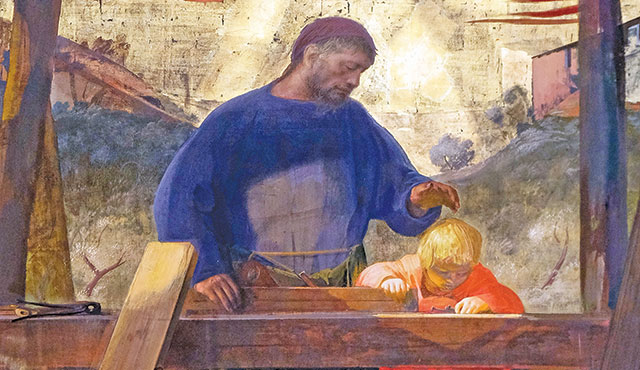The Gospels record no words spoken by St. Joseph, but that does not diminish his exalted status in the Communion of Saints. On the 150th anniversary of Blessed Pope Pius IX naming St. Joseph patron of the Universal Church, Pope Francis has dedicated 2021 as the “Year of St. Joseph.” The holy year formally commenced on Dec. 8, 2020, the Feast of the Immaculate Conception, and will conclude Dec. 8, 2021.
In choosing to honor St. Joseph, Pope Francis is summoning a great spiritual resource during the age of COVID-19. Like his spouse, the Blessed Virgin Mary, St. Joseph has earned many titles over the centuries. In addition to patron of the Universal Church, he is known as patron of workers, Guardian of the Redeemer, and patron for a happy death. “In this time of the pandemic, all of these titles for St. Joseph can be helpful” in finding meaning in this uncertain time, said Lesa Truxaw, director of the Office for Worship for the Diocese of Orange.
Pope Francis saw the legacy of St. Joseph in the essential, front-line workers who have emerged as unsung heroes in our time. “How many fathers, mothers, grandparents and teachers are showing our children, in small everyday ways, how to accept and deal with a crisis by adjusting their routines, looking ahead and encouraging the practice of prayer,” Francis said. “Each of us can discover in Joseph … an intercessor, a support and a guide in times of trouble.”
St. Joseph was also the head of the Holy Family, charged with protecting Mary and Jesus through pivotal years of formation and upbringing. While the Gospel of Luke tells the nativity story from the perspective of Mary, St. Matthew’s Gospel focuses on Joseph’s dilemma as he ponders and prays how to best respond to news of Mary’s pregnancy (cf. Mt. 1:18). “Unwilling to expose her to shame, he decided to divorce her quietly” (Mt. 1:19). But in a dream Joseph is told to “not be afraid,” and it is Joseph’s quiet, resolute role as husband and father that leads the Holy Family to safety from King Herod.
The Year of St. Joseph provides an opportunity to reintroduce the faithful to the heroism of St. Joseph. “By setting aside a year dedicated to St. Joseph, it helps us focus on specific aspects or teachings of the Church,” Truxaw said, noting the recent Year of Mercy (2015-2016) and Year of Faith (2012-2013). Parishes can identify certain prayers and activities to help foster meditation toward not only St. Joseph, but the traits of his person.
Pope Francis focused on a few of these traits in his apostolic letter announcing the Year of St. Joseph in his apostolic letter, “Patris Corde” (A Father’s Heart). The pontiff particularly emphasized Joseph’s dedicated role as father. Indeed, the entire document is structured around meditations on Joseph’s fatherhood. He refers to him as “a beloved father,” “a tender and loving father,” “an obedient father,” “an accepting father,” “a creatively courageous father,” “a working father,” and “a father in the shadows.”
In referring to St. Joseph as “a father in the shadows,” Pope Francis cited a novel about Joseph, “The Shadow of the Father,” by Polish writer Jan Dobraczyński (1910-1994). “In his relationship to Jesus, Joseph was the earthly shadow of the heavenly Father: he watched over him and protected him, never leaving him to go his own way,” the pope said.
This is a pointed remark to the perilous role of fathers in today’s society. One in four American children live without a biological, step, or adoptive father in the home, according to the U.S. Census Bureau. Fifty percent of marriages in the U.S. end in divorce. Recognizing the absent role of fathers and creating activities during the Year of St. Joseph, specifically for fathers, are ways parishes can actualize St. Joseph’s spiritual presence this year.
While Joseph is not the biological father of Jesus, Pope Francis argues that he shows us what true fatherhood is, and thus is a lesson for fathers today. “A man does not become a father simply by bringing a child into the world, but by taking up the responsibility to care for that child,” Francis noted. Such deep thoughts from our own Holy Father challenge us, especially fathers themselves, to approach this Year of St. Joseph in an intentional, deep way.
Like all the saints, St. Joseph’s life is one of “concrete proof that it is possible to put the Gospel into practice.” He was also open to the radical change that God can affect in men and women. When we first meet Joseph in the Gospel of St. Matthew, he is only Joseph of Nazareth, a carpenter. By the end, he is husband, father, and patron to us all.
“We need only ask St. Joseph for the graces of graces,” Pope Francis concluded. “Our conversion.”

